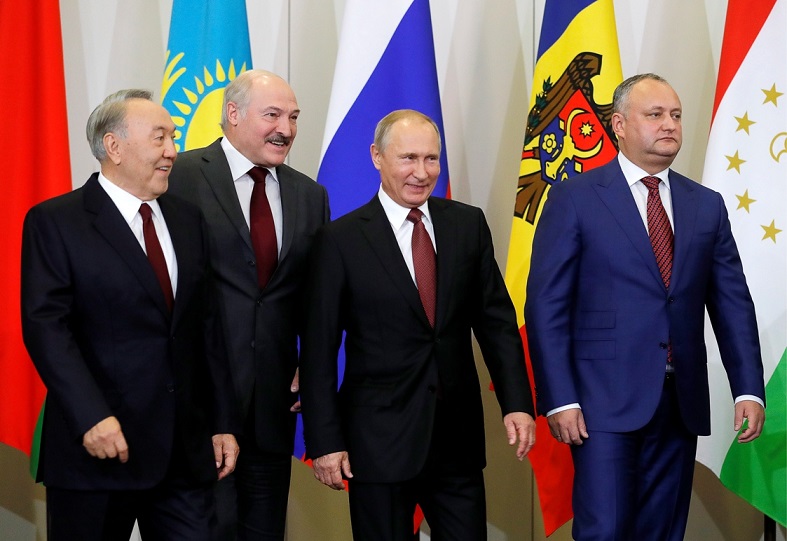The leaders of 11 countries gathered in Sochi on October 11 for the 7th Summit of the Council of Head of States of the Commonwealth of Independent States (CIS) to discuss ways to expand economic and security ties.
Kazakhstan’s President Nursultan Nazarbayev called for a free trade agreement on services during the one-day event.
"Free trade in services on the territory of the CIS will open new opportunities for our businessmen, and bring our countries' trade and economic cooperation to a new level,” the head of the Central Asia’s largest economy said while addressing the session.
CIS is an organization that unites the majority of the former Soviet Union republics, including most countries in the Caspian region. The organization was founded by Belarus, Russia and Ukraine in 1991, upon the dissolution of the USSR, and today has nine members and two associate members (Ukraine and Turkmenistan). With a combined gross domestic product (GDP) of about $1.58 trillion, the CIS countries, as an economic bloc, are on par with the economies of the Eastern Europe, whose GDP amounts to $1.2 trillion.
A Free Trade Zone Agreement, signed in 1993, was ratified only in 2012 and replaced more than 100 bilateral documents regulating trade within the commonwealth area. Immediately after the ratification of the document, the CIS member countries announced their intention to create a free trade zone on services, but they failed to reach an agreement thus far.
While the current agreement provides for the gradual removal of customs duties between member countries, an agreement that includes services will give CIS member states more preferential access to service markets. These include sectors such as transportation, communications, housing and communal services, catering, hotels, tourism, insurance, banking, information and consulting services, real estate and construction.
Services have not been included in the 1993 agreement, because member states disagreed on the mechanics of the arrangement, particularly in reference to financial services, investments, labor issues, and the presence of individuals from one country in another.
In Sochi leaders signed nearly two dozen agreements aimed at the prevention, detection, suppression, disclosure and investigation of crimes and other offenses related to corruption. The package of documents also includes an agreement to counteract money laundering, the financing of terrorism, and proliferation of weapons of mass destruction, as well as a protocol for transfers of narcotic drugs, psychotropic substances and their precursors; firearms, their main parts, ammunition, explosives and explosive devices that are physical evidence in criminal cases.
“We agreed to continue close coordination on foreign policy and security issues. The CIS countries jointly oppose the threats of the spread of terrorism and extremism, and intend to increase the exchange of information and experience through the competent authorities,” Russia’s President Vladimir Putin said during a press briefing.
Following the CIS summit, Tajikistan assumed the chairmanship of the group. The next summit will be held in Dushanbe sometime in late 2018.







 The Islamic holy month of fasting, Ramadan comes to an end this week with the celebration of a joyous festival called Eid (meaning “festival” in Ar...
The Islamic holy month of fasting, Ramadan comes to an end this week with the celebration of a joyous festival called Eid (meaning “festival” in Ar...
 Iran's senior military leaders described the drone and missile attack on Israel on April 14 night as “successful".
Iran's senior military leaders described the drone and missile attack on Israel on April 14 night as “successful".
 Iranian President Ebrahim Raisi warned Israel that it would face a "real and extensive" response if it makes any "mistake" following Tehran’s missi...
Iranian President Ebrahim Raisi warned Israel that it would face a "real and extensive" response if it makes any "mistake" following Tehran’s missi...



